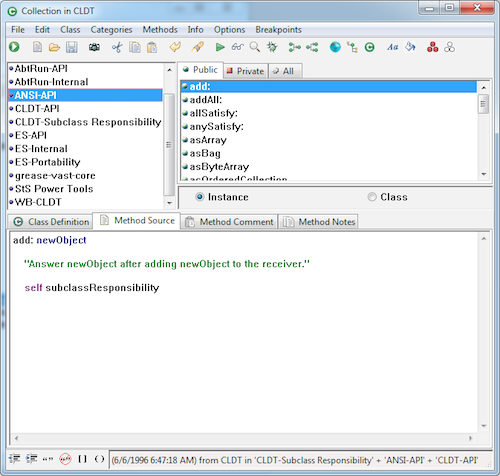Regular Screencasts Return Tomorrow
I'm taking a short break from screencasting - basically, the 3 days around Christmas. Things will be back to normal tomorrow on that front.
The author of this blog, James Robertson, passed away in April 2014. This blog is being maintained by David Buck (david@simberon.com).
I'm taking a short break from screencasting - basically, the 3 days around Christmas. Things will be back to normal tomorrow on that front.
The Times is crowing about "Snowfall" - a story it took them 6 months (and many people) to put together. Here's the problem - it's mostly irritating. Why?
As I scroll through, trying to read the text, video and photos suddenly appear out of nowhere. Not embedded normally, there's some clever, but mostly irritating, Javascript/HTML 5 involved. The clever embedding takes me right out of the story, and forces me to pay attention to.... trivia.
This isn't a large newsroom showing me potential; it's a large newsroom that's forgotten how to put together a story in a way that engages readers. Oh, and it cost tons of money, too. So not winning....
Welcome to episode 108 of Independent Misinterpretations - a Smalltalk and dynamic language oriented podcast with James Robertson and David Buck.
This week we have a recording from the Smalltalks 2012 conference in Argentina - Guillermo Polito talking about bootstrapping Smalltalk. If you would rather watch the video, head on over to the YouTube channel.
You can subscribe to the podcast in iTunes (or any other podcatching software) using this feed directly or in iTunes with this one.
To listen now, you can either download the mp3 edition, or the AAC edition. The AAC edition comes with chapter markers. You can subscribe to either edition of the podcast directly in iTunes; just search for Smalltalk and look in the Podcast results. You can subscribe to the mp3 edition directly using this feed, or the AAC edition using this feed using any podcatching software. You can also download the podcast in ogg format.
If you like the music we use, please visit Josh Woodward's site. We use the song Troublemaker for our intro/outro music. I'm sure he'd appreciate your support!
If you have feedback, send it to jarober@gmail.com - or visit us on Facebook - you can subscribe in iTunes using this iTunes enabled feed.. If you enjoy the podcast, pass the word - we would love to have more people hear about Smalltalk!
Tags: smalltalks, smalltalk, bootstrapping
Enclosures:
[im108.m4a ( Size: 12199235 )]
Welcome to episode 108 of Independent Misinterpretations - a Smalltalk and dynamic language oriented podcast with James Robertson and David Buck.
This week we have a recording from the Smalltalks 2012 conference in Argentina - Guillermo Polito talking about bootstrapping Smalltalk. If you would rather watch the video, head on over to the YouTube channel.
You can subscribe to the podcast in iTunes (or any other podcatching software) using this feed directly or in iTunes with this one.
To listen now, you can either download the mp3 edition, or the AAC edition. The AAC edition comes with chapter markers. You can subscribe to either edition of the podcast directly in iTunes; just search for Smalltalk and look in the Podcast results. You can subscribe to the mp3 edition directly using this feed, or the AAC edition using this feed using any podcatching software. You can also download the podcast in ogg format.
If you like the music we use, please visit Josh Woodward's site. We use the song Troublemaker for our intro/outro music. I'm sure he'd appreciate your support!
If you have feedback, send it to jarober@gmail.com - or visit us on Facebook - you can subscribe in iTunes using this iTunes enabled feed.. If you enjoy the podcast, pass the word - we would love to have more people hear about Smalltalk!
Tags: smalltalk, bootstrapping, smalltalks
Enclosures:
[im108.mp3 ( Size: 8767519 )]
Squeak is in the process of releasing its latest version Squeak4.4. Frank Shearar, the release manager, has just released the latest release candidate for public vetting by the community. Download it. Take a look. Post feedback on the Squeak-dev mailing list.
Tags: squeak
 |
Welcome to episode 35 of "Thu'umcast" - a podcast where Michael Lucas-Smith, Scott Dirk, Austin Haley, Makahlua and I document our trials and tribulations in Elder Scrolls V: Skyrim Today, James and Michael talk about playing the game on Expert Difficulty - and Michael explains why you probably should avoid Master. The podcast ends a bit abruptly while we were off on a rant about the gaming industry in general - this was recorded while I was on the road, and the hotel wifi just cut out on us. If you liked our work on That Podcast, you'll probably like this. We intend to stay with the same idea - a gameplay podcast. If you don't want spoilers, don't listen - we are going to be talking about how we play the game, and what we ran across as we played. |
You can subscribe in iTunes (or any podcatcher) using this feed, or this one for the AAC edition. We'll add the iTunes specific links as soon as they are available. In the meantime, join the Facebook Group and follow us on Twitter. If you play on Steam, join the Steam Group. Like the music? Pay Sbeast a visit, we thank him for letting us use it!
Links to all episodes and other information can be found on the Thu'umcast page.
If you want to download the podcast directly, we've provided it in three formats:
Got feedback? Tweet us!. Enjoy the podcast, and we'll see you in Skyrim!
Tags: skyrim, elder scrolls, thuumcast, expert
Enclosures:
[thuum35.m4a ( Size: 19578254 )]
 |
Welcome to episode 35 of "Thu'umcast" - a podcast where Michael Lucas-Smith, Scott Dirk, Austin Haley, Makahlua and I document our trials and tribulations in Elder Scrolls V: Skyrim Today, James and Michael talk about playing the game on Expert Difficulty - and Michael explains why you probably should avoid Master. The podcast ends a bit abruptly while we were off on a rant about the gaming industry in general - this was recorded while I was on the road, and the hotel wifi just cut out on us. If you liked our work on That Podcast, you'll probably like this. We intend to stay with the same idea - a gameplay podcast. If you don't want spoilers, don't listen - we are going to be talking about how we play the game, and what we ran across as we played. |
You can subscribe in iTunes (or any podcatcher) using this feed, or this one for the AAC edition. We'll add the iTunes specific links as soon as they are available. In the meantime, join the Facebook Group and follow us on Twitter. If you play on Steam, join the Steam Group. Like the music? Pay Sbeast a visit, we thank him for letting us use it!
Links to all episodes and other information can be found on the Thu'umcast page.
If you want to download the podcast directly, we've provided it in three formats:
Got feedback? Tweet us!. Enjoy the podcast, and we'll see you in Skyrim!
Tags: skyrim, elder scrolls, thuumcast, expert
Enclosures:
[thuum35.mp3 ( Size: 14299684 )]
Today's Smalltalk 4 You looks at the a cool - but dangerous - thing in Smalltalk - the ability to handle messages that are not understood. If you have trouble viewing it here in the browser, you can also navigate directly to YouTube. To watch now, click on the image below:
If you have trouble viewing that directly, you can click here to download the video directly. If you need the video in a Windows Media format, then download that here.
You can also watch it on YouTube:
One of the things you'll run across in Smalltalk is the ability to handle a "Message Not Understood" exception. While there are uses for such handling (proxy development, for example) - it's often quite dangerous. Even more dangerous is implementing a catchall #doesNotUnderstand: message to your class - it can simply swallow all such MNU exceptions, leading to very bizarre behavior. Consider a simple Counter class with a one up counter, and an #addOne (but no #subtractOne) method, and this implementation:
doesNotUnderstand: aMessage Transcript show: 'Not Understood: ', aMessage selector printString; cr
It seems simple enough, but consider the case where that counter is meaningful. A user of the class might think #subtractOne works, and then end up with unexpected values. It can be more serious in a real application - recently, I've been upgrading a VisualWorks 7.6 application to VisualWorks 7.9.1. One of the parts swallowed exceptions like what we have above, and finding the missing methods became very difficult.
Need more help? There's a screencast for other topics like this which you may want to watch. Questions? Try the "Chat with James" Google gadget over in the sidebar.
Enclosures:
[st4u324-iPhone.m4v ( Size: 3647888 )]

|
Today's Javascript 4 You looks at the gt() function in JQuery. If you have trouble viewing it here in the browser, you can also navigate directly to YouTube. Join the Facebook Group to discuss the tutorials. You can view the archives here. |
To watch now, click on the image below:
If you have trouble viewing that directly, you can click here to download the video directly. If you need the video in a Windows Media format, then download that here.
You can also watch it on YouTube:
Tags: javascript, maps
Enclosures:
[js4u231-iPhone.m4v ( Size: 1237576 )]
For those of you who use something other than Facebook (or maybe in addition to it) - Pharo is now on Google Plus.
Tags: pharo
Today's Smalltalk 4 You goesback to Polymorphism in Smalltalk for some more discussion. If you have trouble viewing it here in the browser, you can also navigate directly to YouTube. To watch now, click on the image below:
If you have trouble viewing that directly, you can click here to download the video directly. If you need the video in a Windows Media format, then download that here.
You can also watch it on YouTube:
We've gone over a basic polymorphism example, but one point needs to be made: when you decide to add polymorphic behavior to your own objects, the API you need to cover is typically small. What if you need to cover a system class - like, say, Collection?

In the simple example we covered here, there was one method to create in each object: #currentValue. If you intend to cover something larger, you'll have more work to do.
Need more help? There's a screencast for other topics like this which you may want to watch. Questions? Try the "Chat with James" Google gadget over in the sidebar.
Tags: smalltalk, polymorphism
Enclosures:
[st4u323-iPhone.m4v ( Size: 2411402 )]